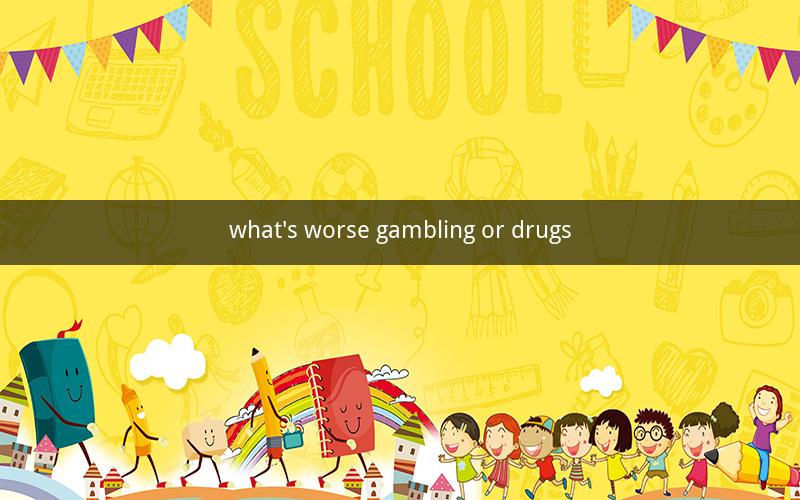
Table of Contents
1. Introduction to the Debate
2. Understanding Gambling
3. Understanding Drugs
4. The Psychological Impact of Gambling
5. The Psychological Impact of Drugs
6. The Social Impact of Gambling
7. The Social Impact of Drugs
8. Economic Consequences of Gambling
9. Economic Consequences of Drugs
10. Legal and Ethical Considerations
11. Conclusion
1. Introduction to the Debate
The debate over whether gambling or drug use is worse has been a topic of controversy for years. Both activities carry significant risks and consequences, both for individuals and society. This essay aims to explore the various aspects of both gambling and drug use, considering their psychological, social, economic, and legal implications.
2. Understanding Gambling
Gambling involves risking money or something of value on an uncertain event with the intention of winning money or something of value. It can range from casual games like poker or bingo to more organized forms such as sports betting or casino games. While many people engage in gambling for entertainment, it can become an addiction for some, leading to severe consequences.
3. Understanding Drugs
Drug use refers to the consumption of psychoactive substances that alter brain function. These substances can be legal, such as alcohol or prescription medications, or illegal, such as cocaine or heroin. Drug use can have both short-term and long-term effects on an individual's health, relationships, and overall well-being.
4. The Psychological Impact of Gambling
Gambling addiction can lead to a range of psychological issues, including anxiety, depression, and paranoia. Individuals with gambling problems often experience intense feelings of guilt, shame, and remorse. They may also struggle with self-esteem and self-worth, as their addiction continues to take a toll on their lives.
5. The Psychological Impact of Drugs
Drug addiction can have devastating psychological consequences, including cognitive impairments, mood disorders, and personality changes. Individuals with drug problems often experience a loss of control over their behavior, as well as a decrease in their ability to make rational decisions.
6. The Social Impact of Gambling
Gambling addiction can strain relationships, as individuals with the problem may become secretive, dishonest, and manipulative. They may also neglect their responsibilities, leading to financial and emotional turmoil for their loved ones. Additionally, gambling-related crime, such as fraud and theft, can have a negative impact on communities.
7. The Social Impact of Drugs
Drug addiction can have a profound impact on social relationships, as individuals with the problem may become isolated and estranged from their friends and family. They may also engage in risky behaviors, such as driving under the influence or participating in violent activities. Drug-related crime, such as drug trafficking and theft, can also contribute to social instability.
8. Economic Consequences of Gambling
Gambling addiction can lead to significant financial losses for individuals and their families. These losses can result in debt, bankruptcy, and homelessness. Additionally, the cost of treating gambling addiction can be substantial, both for individuals and society.
9. Economic Consequences of Drugs
Drug addiction can have a profound impact on the economy, as individuals with the problem may lose their jobs and contribute to increased healthcare costs. Drug-related crime can also have a significant economic impact, as it requires resources for law enforcement, legal proceedings, and crime prevention.
10. Legal and Ethical Considerations
Both gambling and drug use are subject to legal and ethical considerations. Gambling is legal in many countries, but it is also regulated to prevent addiction and related harms. Drug use, on the other hand, is illegal in many countries, but there is growing debate over the effectiveness of drug prohibition and the potential benefits of harm reduction approaches.
11. Conclusion
The debate over whether gambling or drug use is worse is complex and multifaceted. Both activities carry significant risks and consequences, both for individuals and society. While it is difficult to definitively state which is worse, it is clear that both require attention and intervention to mitigate their negative impacts.
Questions and Answers
1. What are the psychological effects of gambling addiction?
- Gambling addiction can lead to anxiety, depression, paranoia, and a decrease in self-esteem and self-worth.
2. How does drug use affect cognitive function?
- Drug use can cause cognitive impairments, such as memory loss, difficulty concentrating, and impaired decision-making.
3. What are the social consequences of gambling addiction?
- Gambling addiction can strain relationships, lead to financial and emotional turmoil, and contribute to gambling-related crime.
4. How does drug use affect social relationships?
- Drug use can lead to isolation, estrangement from loved ones, and engagement in risky behaviors, such as violence and theft.
5. What are the economic consequences of gambling addiction?
- Gambling addiction can result in significant financial losses, debt, bankruptcy, and increased healthcare costs.
6. How does drug use impact the economy?
- Drug addiction can lead to job loss, increased healthcare costs, and the cost of law enforcement and legal proceedings related to drug-related crime.
7. What are the legal implications of gambling?
- Gambling is legal in many countries but is subject to regulations to prevent addiction and related harms.
8. How are drug use and addiction treated legally?
- Drug use is illegal in many countries, but there is growing debate over the effectiveness of drug prohibition and the potential benefits of harm reduction approaches.
9. What is harm reduction, and how does it apply to drug use?
- Harm reduction is a public health approach that aims to minimize the negative consequences of drug use, including through needle exchange programs, overdose prevention, and access to treatment.
10. How can individuals seek help for gambling or drug addiction?
- Individuals with gambling or drug addiction can seek help through counseling, support groups, and treatment programs designed to address their specific needs.